Project – SEO Blog Automation with Webflow, Airtable, Make & Real Content Strategy
I designed and developed a full Webflow website for a client aiming to rent out their apartment, focusing on SEO and user experience. I also built a no-code automation system using Airtable, Make, and ChatGPT to auto-generate and publish content. To stay ahead of Google’s upcoming SGE rollout in France, I enhanced the workflow by pairing AI-written articles with authentic, high-quality local photos provided by trusted partners.
Project Summary
- Designed and built a full SEO blog using Webflow
- Connected a no-code workflow to automate content creation
- Set up SEO structure, blog CMS, and responsive UI
- Used Airtable + Make + ChatGPT to auto-generate articles
- Replaced generic AI images with authentic local visuals
- Ensured content is aligned with Google's future SGE update
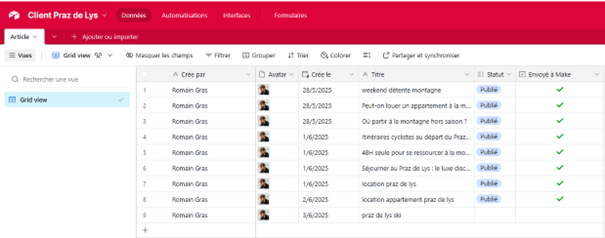
Automation Setup – From Keyword to Published Article
The workflow begins in Airtable, where a simple keyword entry triggers the full content creation process. Airtable acts as a lightweight CMS, making it easy for non-technical users to contribute topics at scale.
Using Make, the keyword is sent to an AI (ChatGPT) which generates a full article and a matching AI-generated header image. This content is then automatically formatted and pushed into the Webflow CMS as a draft.
This system eliminates repetitive work and ensures consistent, SEO-ready output while allowing for review before publication.
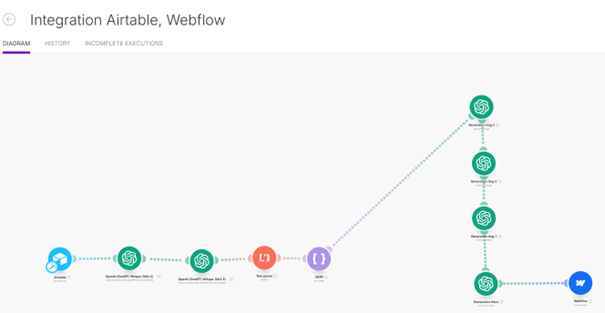
Webflow – Design & Structure for SEO
I built and styled the Webflow blog layout to reflect the visual identity of the landing page. The structure is fully responsive and optimized for readability, using clear typographic hierarchy and strong SEO fundamentals (semantic tags, structured content, and image alt attributes).
Articles arrive in the CMS pre-formatted, making the publishing workflow fast and user-friendly.
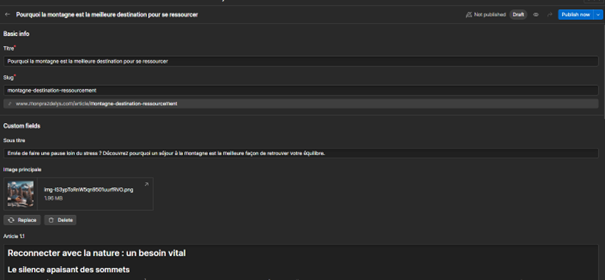
SEO Strategy – Preparing for Google's Search Generative Experience (SGE)
From past experience building SEO landing pages, I’ve learned to anticipate Google’s evolving standards. With the upcoming release of Google SGE, the classic “rank and click” model is being replaced by AI-generated answers directly in search results.
To be visible in this new system, content must now be:
- Structurally clear and easy to read
- Factual, localized, and directly useful
- Rich enough to be selected as a reliable source by Google’s AI
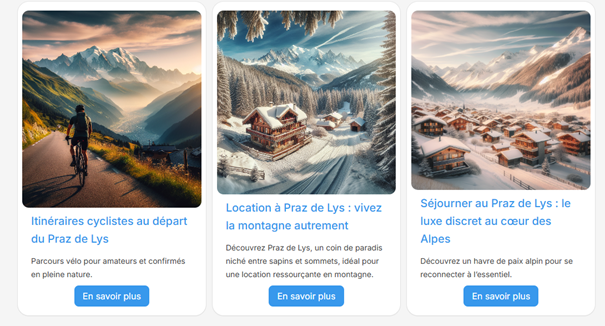
This realization led me to revisit how content is generated and represented.
Visual Credibility – Replacing AI Images with Real Photos
One major risk I identified was relying solely on generic AI-generated visuals. While efficient, they often fail to reflect real places or contexts, which can hurt user trust and search rankings.
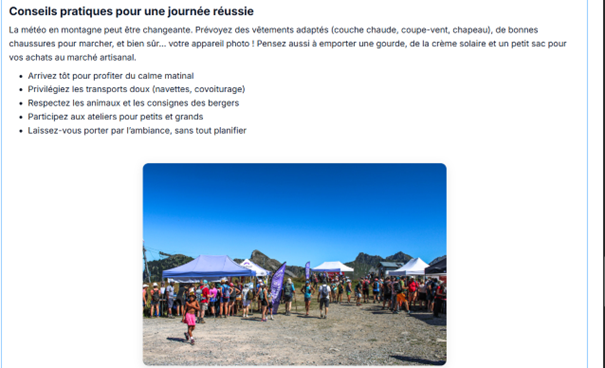
To fix this, I contacted the Praz de Lys tourism office, who shared a curated Flickr gallery of legal, high-quality local images. I then integrated these images into the Airtable base — each article record now includes a direct link to a photo chosen from this official source.
The automation scenario in Make was updated to include these photos, ensuring every article pairs real visuals with AI content — improving authenticity and relevance.
Final Outcome
By blending automation and human judgment, I created a smart publishing workflow that’s fast, credible, and future-proof. The system scales easily, remains fully editable, and positions each article for visibility in a post-SGE world.
This approach balances AI speed with real-world accuracy — proving that no-code tools, when used thoughtfully, can deliver high-impact results. This visual strategy also improves user trust and reflects the real atmosphere of the region, which generic AI images cannot replicate."
.jpg)
.jpg)



